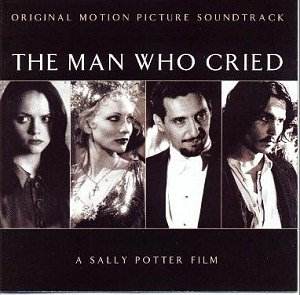Sally Potter describes her new film that stars Christina Ricci, Cate Blanchett,
John Turturro and Johnny Depp thus: "The Man Who Cried is a story about survival
set in Paris in 1939. A girl, Suzie, looses everything and everyone she loves,
but nevertheless finds a singing voice and begins a search for her long-lost
father. The people she meets along the way (Lola, a Russian dancer; Dante,
an Italian opera singer; and Cesar, a gypsy horseman) are also trying to
survive, each in his or her own way. At first their struggles are personal
- the fight for friendship, for money and power, for love. But with the threat
of war, survival issues become matters of life or death…[a film] for
grieving for the gypsies who lost their lives in the concentration camps
of the Second World War."
Potter incorporates several operatic arias sung with fervour by the up-and-coming
young Italian tenor, Salvatore Licitra. These are: the stirring 'Di quella
pira' from Verdi's Il trovatore; the romantic 'E lucevan le Stelle'
from Puccini's Tosca; and the melancholy 'Je crois entendre encore'
from Bizet's The Pearl Fishers which appears three times on this
album in different forms - twice with the Orchestra of the Royal Opera House
conducted by Sian Edwards (but in one case with Yiddish lyrics); and with
the Labeques. It therefore becomes something of a key thematic reference.
An extraordinary but very apt arrangement, again by Golijov, of 'Dido's Lament'
from Purcell's Dido and Aeneas is sung by Iva Bittová with
the gypsy band, Taraf de Haïdouks. Other source music includes another
vivid, strongly-accented arrangement by Golijov of the old standard 'Jealousy'
and an arrangement of the blues number, 'Gloomy Sunday' sung with great feeling
by Iva Bittová with a jazz trio of piano, bass and drums. A rendering
of the Neapolitan number, 'Torna a Surriento' by Licitra is also included.
But it is the amazing original music composed by Golijov that impresses most.
For such a dark story he produces some profound and deeply disturbing music.
'Close Your Eyes' uncannily evokes tear drops falling in the perspectives
of the Kronos's 'glassy' pizzicatos'. An extraordinary piece this, very evocative
and sadly ruminative. Another remarkable Golijov cue is 'Without a word'.
This evokes a nightmare world, probably of the Nazi gas chambers. You marvel
how Golijov persuades the Kronos players to suggest such disturbing off stage
screaming and low moanings. But there are also many tracks of colourful and
more joyful gypsy dances performed by Taraf de Haïdouks.
A most unusual score for the adventurous.
Ian Lace





